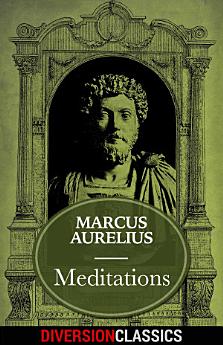Meditations (Diversion Classics)
เม.ย. 2016 · Diversion Books
5.0star
4 รีวิวreport
eBook
190
หน้า
family_home
มีสิทธิ์
info
reportคะแนนและรีวิวไม่ได้รับการตรวจสอบยืนยัน ดูข้อมูลเพิ่มเติม
เกี่ยวกับ eBook เล่มนี้
Featuring an appendix of discussion questions, the Diversion Classics edition is ideal for use in book groups and classrooms.
Meditations is a series of private reflections and philosophical essays from Roman Emperor Marcus Aurelius. In a translation that engages the reader, Mediationsexpands the Stoic philosophical movement that Aurelius held closely to his heart. Often spurning the extremes of good and evil, Aurelius champions rationality and calm over all else.
A moving, deeply personal response to a life of privilege and responsibility, the legacy of this canonical work still resonates with world leaders, educators and philosophers to this day.
Meditations is a series of private reflections and philosophical essays from Roman Emperor Marcus Aurelius. In a translation that engages the reader, Mediationsexpands the Stoic philosophical movement that Aurelius held closely to his heart. Often spurning the extremes of good and evil, Aurelius champions rationality and calm over all else.
A moving, deeply personal response to a life of privilege and responsibility, the legacy of this canonical work still resonates with world leaders, educators and philosophers to this day.
การให้คะแนนและรีวิว
5.0
4 รีวิว
Sasiwimol Duangta
- แจ้งว่าไม่เหมาะสม
16 ธันวาคม 2565
very good
เกี่ยวกับผู้แต่ง
Born in Rome, in 121, Marcus Aurelius was one of the most respected emperors in Roman history. When he was 17, Aurelius was adopted by emperor Antonius Pius and succeeded him in A.D. 161. He ruled jointly with his adoptive brother, Lucius Verus, until 169, when he became sole emperor after Verus died. Although Aurelius was a humanitarian ruler, he accepted the view that Christians were the enemies of Rome. Aurelius was dovoted to the Stoic philosophy. Meditations, his spiritual reflections, is considered a classic work of stoicism. Written in Greek, the work comprises of twelve books and records his innermost thoughts. Meditations is his only surviving work. Aurelius died in 180 while prosecuting war against the Marcomanni who lived along the northern limits of the Roman Empire. After his death Aurelius was idealized as the perfect emperor whose reign contrasted sharply with the disastrous period before him and the reigns that followed.
ให้คะแนน eBook นี้
แสดงความเห็นของคุณให้เรารับรู้
ข้อมูลในการอ่าน
สมาร์ทโฟนและแท็บเล็ต
ติดตั้งแอป Google Play Books สำหรับ Android และ iPad/iPhone แอปจะซิงค์โดยอัตโนมัติกับบัญชีของคุณ และช่วยให้คุณอ่านแบบออนไลน์หรือออฟไลน์ได้ทุกที่
แล็ปท็อปและคอมพิวเตอร์
คุณฟังหนังสือเสียงที่ซื้อจาก Google Play โดยใช้เว็บเบราว์เซอร์ในคอมพิวเตอร์ได้
eReader และอุปกรณ์อื่นๆ
หากต้องการอ่านบนอุปกรณ์ e-ink เช่น Kobo eReader คุณจะต้องดาวน์โหลดและโอนไฟล์ไปยังอุปกรณ์ของคุณ โปรดทำตามวิธีการอย่างละเอียดในศูนย์ช่วยเหลือเพื่อโอนไฟล์ไปยัง eReader ที่รองรับ








